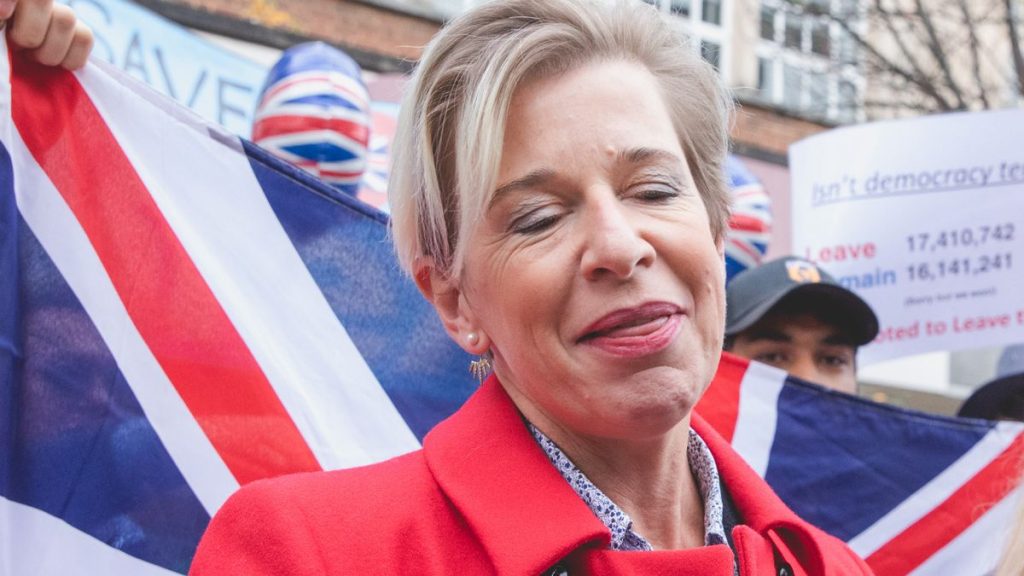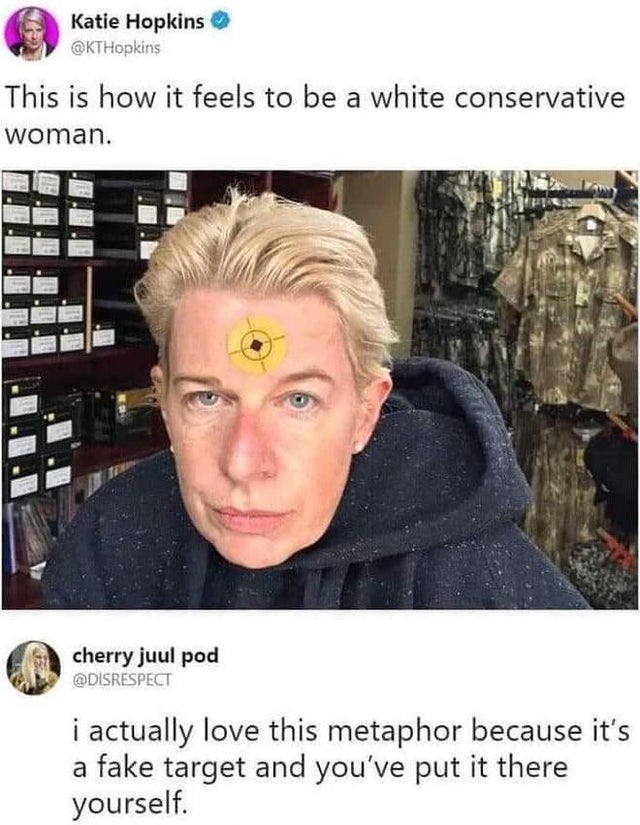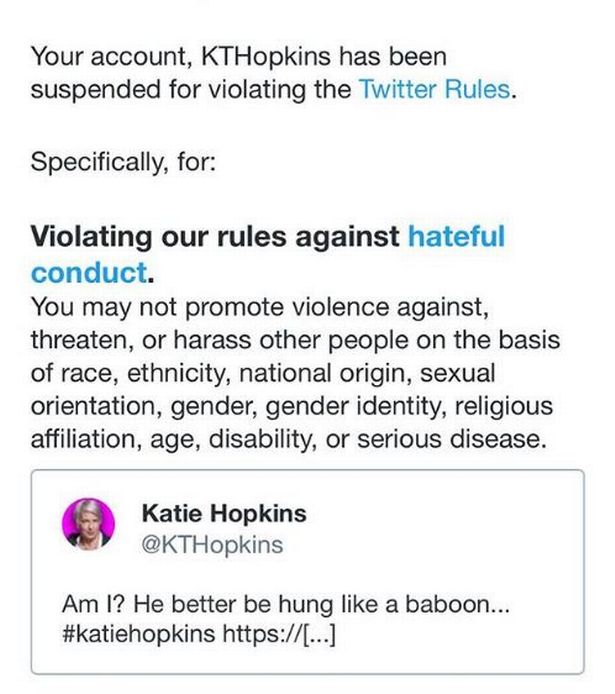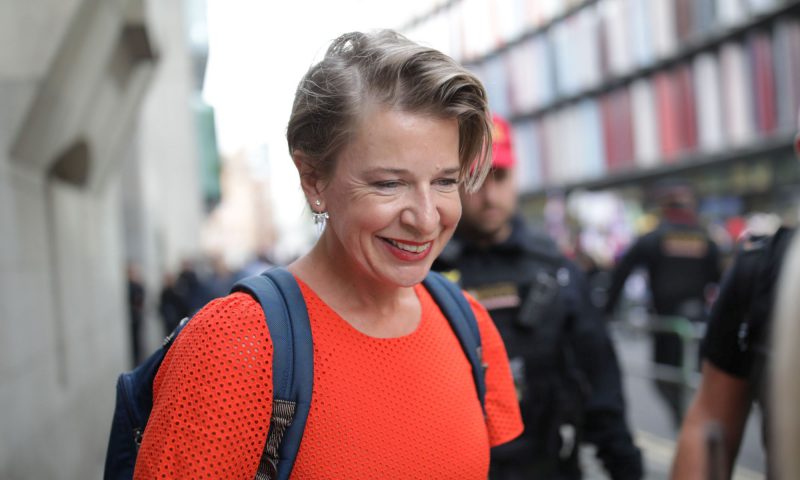Last Saturday, June 19 it was announced that controversial commentator Katie Hopkins’ latest twitter suspension would this time not be temporary.
Hopkin’s shot to modest stardom in 2006 as a contestant on the UK version of the US business-styled reality TV show The Apprentice. She then went on to make a career from various television appearances, including a stint on Celebrity Big Brother in 2015 in which she garnered criticism for her harsh comments, which were not limited to describing fellow contestant and breast cancer survivor Linda Nolan as “fat” with “droopy breasts”. Much of her recent notoriety, however, has resulted from her provocative political opinions. She has been briefly associated with several national publications, including a 2015 column in The Sun in which she described migrants as “like cockroaches”. She also hosted a weekly LBC talk show from 2016 until she was abruptly dismissed in May 2017 after a tweet suggesting that the aftermath of the Manchester terrorist attack required a “final solution”.
Yet Twitter’s decision to permanently ban Hopkins was not accompanied by evidence of specific policy violations. According to a Sky News Australia interview on Sunday, she has not been made aware of this information privately either. Instead, the announcement of her removal cited its “hateful conduct” policy that prohibits incitement of violence or direct written attacks and threats on other people, based on a wide range of personal characteristics such as race, gender or sexual orientation. Yet, these violations of Twitter policy are also explicit violations of various laws in the United Kingdom. Thus in this circumstance, it would seem appropriate for Twitter to cite particular posts as justification for Hopkins’ ban, and for legal action to be initiated against her immediately.

Rather than Hopkins having made criminal threats specified as “hateful”, Twitter has instead judged that the spirit of her account is such and thus deserving of an outright ban. Meanwhile, Twitter has failed to adequately respond to threats of rape and murder against users such as Hopkins’ herself, along with ongoing complaints regarding its failure tackle paedophile networking, religious extremism and uncensored pornography.

Why are we feeding Katie Hopkins
As can only be expected from someone with an ever-expanding list of celebrity feuds and outrageous polemics on issues ranging wildly from Tattoos to Terrorism to baby names, Hopkins clearly revels in the outrage that it has become her profession to attract, and has never appeared to shy away from the vitriol she receives in return. In fact, one of the tweets that Hopkins’ suspects as contributing to her ban was itself a crass, comedic response to a threat of sexual violence.
Those who have sought to see Hopkins censored, only feed into her self-perception as a “conduit of truth”: someone willing to bravely discuss what the “establishment” refuses to. If Katie Hopkins is merely the “Troll” she so often appears to be; then the question remains, why are we feeding her? It sends a message that she is indeed the fearless voice against tyranny she so desperately wants to be and that we are in fact too fragile to handle her. Just days before her ban Hopkins tweeted an image of herself edited to display a crosshair on her forehead, captioned “This is how it feels to be a white conservative woman”. A significant chunk of the responses rightly mocked this rather self-celebratory expression of martyrdom. So why were so many of those same accounts silly enough to prove her right?
Hopkins’ removal from Twitter, will not achieve what those delighting in it seemingly desire: that she and those craving her brand of discourse will simply vanish, or magically recant their “hateful” world views. When governments and private platforms alike decide that particular opinions cannot be expressed, they do not just disappear. The views become ever more galvanised amongst those who hold them. They gain a newfound legitimacy from the idea that powerful organisations cannot “correct” them with a rival argument but must banish them due to the threat their truth poses to conventional narratives. Indeed, the failure of mainstream forums to provide a nuanced, civil outlet for the discussion of contentious issues such as immigration, feminism, Islam and racism, is behind the success of self-styled “no-nonsense” commentators such as Katie Hopkins and Tommy Robinson online, where speech has historically been subject to less gatekeeping.

Yet the last few weeks have shown more than ever, that the menace of the speech suppressors does not only loom for the intentionally inflammatory likes of Hopkins, but for countless among us whose only crime is failing to conform to the majority view on specific issues. Just last month YouTube temporarily removed a video in which Professor of medicine Karol Sikora discussed evidence that coronavirus may be in decline and considered the advantages of the Swedish refusal to implement “lockdown”, for “violating policy”. Although we must always remain distrustful of government interference with private companies such as Twitter, they cannot have the best of both worlds. The task of Google, Twitter, Facebook and other big tech giants is not to create and monitor content- unless it is illegal- but rather to host it. Either these platforms apply editorial rules indiscriminately, or they do not at all. If these corporations decide to curate their sites at their own convenience- rather than explicit violations of their rules- they may edge toward the legal status of publishers rather than platforms (and thus infer legal responsibility for the posts of millions of users) and may ultimately damage their reputation in the long-term.
Although Twitter-style rivals such as Parler and Gab have emerged to fill the “free speech” gap in the social media marketplace, it will likely take them years to even dream of the popularity of its antecedent. For now, the most populated social media sites do- if haphazardly- perform the role of the public square. Hence, their elimination of particular viewpoints continues to exacerbate the epidemic of polarisation and violence that we already face, as perpetrators and apologists of physical force on both Left and Right are increasingly emboldened.

We have seemingly dismissed the concept of objective, even-handed principles and devolved into a situation where the morality of an action is not independent of circumstance but reliant upon it. Suppression of speech and violent threats are deemed acceptable, even honourable when employed against our political opponents, but not when the threats flow in the opposite direction. For example, large segments of the protests against perceived racialised police brutality that have swept the globe since the May 25 killing of unarmed Black American George Floyd by a Minneapolis police officer have often descended into rioting and looting. A top editor at The Philadelphia Inquirer was pushed to resign after penning a fairly tame piece arguing against the destruction of property as a reaction to police brutality spurred outrage. Countless “blue tick” accounts such as Akaash Singh and Joe Bernstein remain uncensored despite recent and explicit incitements to the violence. Meanwhile, certain elements of the Right who have condemned outbreaks of violence among the protestors, have praised the disproportionate response of US police departments who in some areas have clamped down hard on peaceful protestors with tear gas and rubber bullets.
In this brave new world, will the “acceptable” limits of expression simply be decided by what suits the ruthless self-interest of the executives at Twitter, YouTube and Facebook? Or by overreaching governments who seek to restrict free expression on these platforms? What makes those in or out of power uniquely qualified to decide what should and should not be expressed? Those wishing to take on the mantle of censorship for their own political ends are reminiscent of Boromir, the valiant warrior of Gondor of J. R. R. Tolkien’s Lord of the Rings, who seeks to take the One Ring from its bearer Frodo and use it for the greater good of defeating the Dark Lord Sauron. They endeavour to use a means which is evil in itself to achieve good, without realising that to do so is impossible, and is destined to create further harm itself, including within themselves. Let us hope that unlike the tragic fictional character of Boromir, they realise their error before it is too late.


